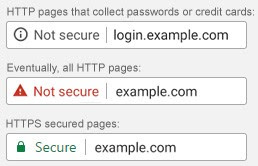Truth be told, this has been a long time coming. We’ve seen warnings, incentives, and hundreds of thousands of websites migrating over to HTTPS instead of HTTP since Google first announced they’d be cracking down on security. As our readers, we wanted you to be aware of the big “final” push Google is making this month (July 2018) to get webmasters officially switching to secure website status.
SSL FTW (for the win)
What you’re going to need to secure this status is an SSL certificate from your hosting provider. SSL stands for Secure Sockets Layer which is just a fancy way to say that your data is better protected (robust encryption) as it flies all over the web (is transferred over a server). This is vitally important when you’re dealing with customers’ sensitive information. Think credit cards, social security numbers, even addresses, email addresses, and phone numbers. People are trusting you with that data. Earn that trust by securing your website; at least this is what Google is now making an imperative move (and we agree with them; it’s just a smart business and ethics decision).
Thumbs Down
So what happens if you decide to forgo security, ignore the Google gods, and leave your website without an SSL certificate? Google will begin to mark your website as insecure. Blatantly so. Whenever a user drops in to check out your wares or services, they’ll be alerted in their URL bar that they’re visiting an insecure site. People are skittish with their personal info. They’ll likely bounce and find somewhere else to spend their money if you refuse to spend yours to protect their information.
Here’s what they’ll see based on your level of security:

Another Day, Another Change
We know, you’re tired of the constant updating and changing and refreshing of platforms and everything web-based. But in order to stay a step ahead of the bad guys, we’ve got to do our due diligence and comply with safety measures. It’s in your best interest and the best interest of the consumer.
For more information on SSL certificates, check out this great article. And as always, give us a shout if you need any help securing your website.

